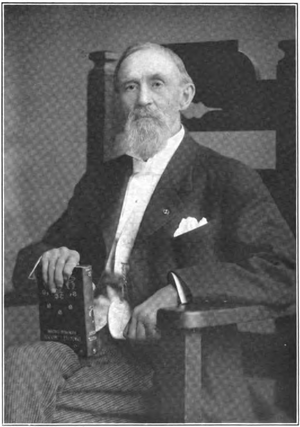James H. Baker (politician) facts for kids
Quick facts for kids
James Heaton Baker
|
|
|---|---|

James H. Baker, circa 1908
|
|
| 11th Ohio Secretary of State | |
| In office January 14, 1856 – January 11, 1858 |
|
| Governor | Salmon P. Chase |
| Preceded by | William Trevitt |
| Succeeded by | Addison P. Russell |
| 2nd Minnesota Secretary of State | |
| In office 1860–1862 |
|
| Governor | Alexander Ramsey |
| Preceded by | Francis Baasen |
| Succeeded by | David Blakeley |
| Personal details | |
| Born | May 6, 1829 Monroe, Ohio |
| Died | May 25, 1913 (aged 84) Mankato, Minnesota |
| Resting place | Glenwood Cemetery, Mankato |
| Political party | Republican |
| Alma mater | Ohio Wesleyan University |
| Military service | |
| Allegiance | Union Army |
| Years of service | 1862-1864 |
| Rank | Colonel Brevet Brigadier General |
| Unit | 10th Minnesota Volunteer Infantry Regiment |
James Heaton Baker was an important American politician. He was a member of the Republican Party. He served as the Secretary of State for two different states: Ohio and Minnesota. He also played a role in the American Civil War.
Contents
Early Life and Career
James H. Baker was born on May 6, 1829. His birthplace was Monroe, in Butler County, Ohio. He went to local schools and later graduated from Ohio Wesleyan University.
After college, he became a teacher. He even managed a school for girls in Richmond, Indiana. In 1853, he bought a newspaper called the Scioto Gazette in Chillicothe, Ohio.
Political Beginnings
In 1855, James Baker was elected as the Ohio Secretary of State. He served one term in this important role. Later, he became the Minnesota Secretary of State from 1860 to 1862.
Service in the Civil War
During the American Civil War, James Baker joined the Union Army. He became a colonel, leading the 10th Minnesota Volunteer Infantry. He served from 1862 to 1863.
He was later put in charge of military police for the Department of Missouri. He continued in this role until the war ended. He officially left the volunteer army on October 21, 1865.
Recognition for Service
For his service, President Andrew Johnson honored Baker. On January 13, 1866, he was nominated to be a brevet brigadier general. This means he received an honorary promotion. The U.S. Senate approved this honor on March 12, 1866.
Life After the War
After the Civil War, Baker continued to serve the public. He was appointed as the Register of Public Lands in Boonville, Missouri. He held this position for two years.
Later, he moved to a farm in Minnesota. President Grant then appointed him Commissioner of Pensions. He served in this role from 1871 to 1875.
The Hanging Monument
James Baker, along with Judge Lorin Cray, helped create a large granite marker. This monument was called the "Hanging Monument." It was built in 1912 in Mankato.
The monument was meant to remember a historical event from 1862. However, it soon became a source of disagreement. Because of this controversy, the City of Mankato removed the monument in 1971.
Later Years and Legacy
James H. Baker passed away on May 25, 1913. He died in Mankato, Minnesota. He is buried at Glenwood Cemetery in Mankato.
 | Bayard Rustin |
 | Jeannette Carter |
 | Jeremiah A. Brown |

